A Story of Page and Place: Gaspereau Press Comes Home to Acadia
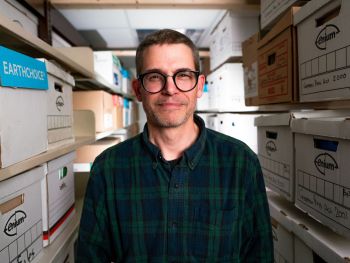
For Andrew Steeves ('96), anything worth doing is worth doing well.
This is the ethos that he and his co-founder, Gary Dunfield (’88) brought to their 28 years of work building Gaspereau Press into an internationally recognized leader in Canadian literature. With their individualized and careful treatment of every book that came through the house, the pair set a new standard for what publishing can look like when you approach it with community building, empathy, and care at its centre.
After nearly three decades operating in the Annapolis Valley, over which they published an abundance of award-winning volumes of poetry and fiction (they won so many Alcuin Society awards that they withdrew themselves from consideration), Gaspereau is changing hands. At the end of 2025, operations will be moved to Sackville, New Brunswick under new ownership, and Andrew and Gary will move onto the next chapter of their lives.
To close the book on this volume of Gaspereau’s story, Andrew and Gary are donating the entire archive of the press to the Acadia University Archives at the Vaughan Memorial Library. Through this window into the creation and operation of Gaspereau, students and scholars from around the world will be able to study the magic that brought this small Nova Scotian press to the world stage.
A love letter to the small, slow, and personal
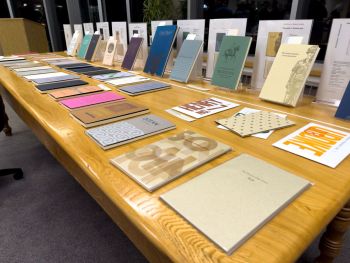
What visitors to the archive will experience is Gaspereau’s commitment to making books with the utmost intentionality and care. They specialized in the small, slow, and personal. Andrew and Gary managed the process from acquisition through to binding of each beautifully designed chapbook of poetry and carefully laid out volume of fiction they printed over the years. At each stage, they invested that extra little bit for a level of care and attention to detail rarely seen today. Their handstitched bindings and letter press covers speak to their philosophy that the object itself is as valuable as the words within it.
Andrew explains that for him, that extra care is worth taking, because the vessel is as important as the story itself. Books, he says, are a pretty recent technology. But telling stories to create connection is something we’ve been doing for a long time.
“Empathy and community making are tied with the act of making books because they’re tied to the act of telling stories and communicating. If there aren’t two people trying to communicate, there’s no book. And a good text or story that’s given a proper embodiment in a good book has the potential to help us understand our way forward as neighbours.”
Living as neighbours and investing in one another are key, for Andrew, to building a world worth living in. And investing in literature and storytelling are the best way into that world. “Someone has to lay bricks and set bones, but we also all have to be able to imagine ourselves in other people’s shoes, to articulate the things we feel deeply, the things we need.”
“If we focus too much on things like STEM, at the exclusion of the humanities, those skills atrophy. Then we have a bunch of really good roads to drive on and nowhere to go. We have hospitals and nothing to be well for.”
The best kind of success story for a library
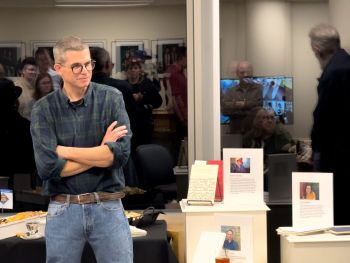
The possibility of living in a community of neighbours is what drew Andrew to building a life in Wolfville. He first came to Acadia as a graduate student in English in 1994 but then left with his wife to go back to Ottawa before immediately returning to Wolfville after one winter in our nation’s capital. “We realized it had been a mistake to leave here,” says Andrew.
“You can do anything anywhere, but the character of a community and a place does seep into what’s possible and how your life unfolds. We made a conscious choice to build a life here because we felt it was a place with substance.”
When he came back to Wolfville, even though he was no longer an Acadia student, he immediately found himself entirely at home amongst the stacks of the Vaughan Memorial Library.
It’s one thing for a university’s library to have an impact on a current student, but entirely another for a community member to have that kind of relationship. It was those relationships at Acadia that led to Gaspereau being what it was.
“For me, the strongest connection with Acadia grew after I came back post-studies and started building this relationship with the materials and the people who were custodians of them,” he says. “The people involved with those collections were engaging with me as a community member, and some probably didn’t realize I had been a student here. That speaks to the importance of those kinds of relationships and the relevance of archives. There’s a direct connection between the materials I had access to in the Special Collections at Acadia and my trajectory as a publisher and book designer.”
“That’s the best kind of success story for a library.”
20 storeys of stories
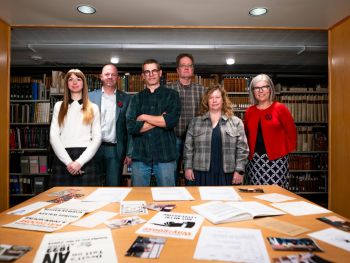
This very library will now house the last 28 years of Andrew’s life and work, no small amount of material. At 60.87 meters of textual records, graphic material and ephemera, the donated material, stacked up, is the height of a 20 storey building.
“This is a remarkable collection—essentially the living history of one of Canada’s most influential small presses,” says Catherine Fancy, Archives Coordinator. “Gaspereau has shaped how we think about the craft of publishing, from design and typography to the way books are made and read. To bring that creative legacy home to Acadia, where both founders were students, is a real privilege.”
The archives will answer the question of what it was like to run a small business in a small place at that moment in history. “On the marquis is correspondence with authors, illustrators, and creative people in our culture,” Andrew explains. “That has all kinds of potential for people doing research on any of these authors. There are manuscripts in various drafts, the objects themselves, the books in various stages and forms.”
Andrew's reasoning behind donating the archive to Acadia, despite appeals from other larger institutions, is a characteristic mix of philosophical, relational, and practical.
“I definitely chose Acadia because of those personal connections that had been fostered through my career with the library and its employees in particular,” Andrew explains. And as an institution, it represents the kind of community that he has spent his career building. “Acadia’s strengths are self-evident,” he says. “You only have to come to this campus and walk around for a day, sit in some classes, engage with the community to see the evident value of studying at an institution that functions at this scale.”
The donation, he says, is also practical in that it will allow him to continue to engage with the material and the scholars working with it. “To donate far afield is truly to hand it off and be done with it, whereas here there’s an opportunity to continue to be involved and help to give context.”
“I get to be part of the collection in a way,” he adds wryly.
And, Andrew says, “there’s great value in a collection residing in the community in which it was created so that the context is right at your fingertips. The community that created and made possible that body of stuff is always the preferred home.”
Don’t just buy the pickles from the store
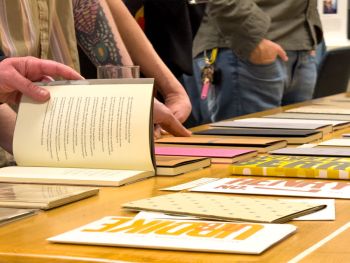
The archive is about more than just access to the objects themselves. Andrew hopes that having access to these archives will inspire future Acadia students to see that story, connection, and community are worth the work.
“At the centre of the archive is a story and I hope that people are encouraged by what we did and by having the ability to look into the fine details of how it happened.”
“You hope they’re encouraged to invest in themselves and in their community, to make things, whatever they are. Whether it’s bread, or pickles, or a cultural enterprise. These things are all on the same continuum. They all take a part of us, they all take attention and care.”
“But we have to believe in the value of doing it. Otherwise, we just go buy pickles from the store. And it’s the same with books.”
Andrew’s dream for the archive will surely come to fruition as students, scholars, future publishers, bakers or pickle makers from around the world draw inspiration to create and lead an interesting life from his body of work.
“Why wouldn’t you want an interesting life? Why wouldn’t you want to do something that at the end of the day, however complicated or inconvenient it was, felt like it meant something?”
